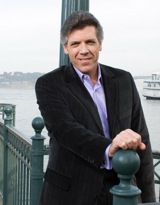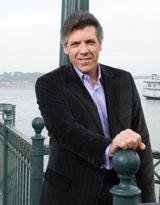Midway through his Song of America recital on Wednesday, presented by San Francisco Performances, Spokane-raised Thomas Hampson paused to address the adoring Herbst Theatre audience he had sung for on 10 previous occasions. “In many of the places where I’ve presented this project," the 54-year-old baritone declared, “people ask me if I’d please sing more songs like that one called Shenandoah. But here, on the 30th anniversary of this wonderful organization, I want to do a group of songs from our own century.”

Hampson then introduced a trio of songs that made a strong statement against aggression. Terming them iconically anti-war, he rallied the metaphorical troops by declaring, “We can all agree, left or right, to despise aggression and the useless loss of life.”
The songs were Richard Danielpour’s Shiloh to the famous poem about the Civil War battle by Herman Melville; the U.S. premiere of Michael Tilson Thomas’ At Ship’s Helm to text by Walt Whitman; and John Corigliano’s One Sweet Morning to a surprisingly strong text by E.Y. "Yip" Harburg of Somewhere Over the Rainbow fame.
Wondrous Voice
In his 23-song recital, which celebrated the 250th anniversary of Francis Hopkinson’s My Days Have Been So Wondrous Free, so far as we know the first art song written by an American, Hampson displayed an instrument that has fared remarkably well with the passage of time. Though on forte passages, a fine layer of grit tended to roughen the steady, mellifluous stream for which Hampson is prized, his soft, floated tones remain sweet and deeply touching.Wisely, he used them sparingly, first melting his audience with the line “Then open thy lattice, love listen to me!” in Stephen C. Foster’s song of the same name. The light voice with which he caressed the opening line of Charles Naginski’s setting of Walt Whitman’s Look Down Fair Moon was just gorgeous, making his forceful description of “faces ghastly, swollen, purple” all the more potent. When Hampson again pared down his voice to a sliver of sound at song’s end, it was not just the sacred moon that showered the audience with silvery light.
Hampson’s intelligence also shone in his choice of repertoire. Seeking to encompass the variety of American art song, Hampson blended some of the most famous and beloved works with songs that — thanks to his passionate advocacy — are deservedly becoming better known. Familiar composers like Aaron Copland, Ives, Foster (heard from twice, if you include the Beautiful Dreamer encore), Virgil Thomson, and Leonard Bernstein rubbed proverbial shoulders with the less-known Arthur Farwell, Elinor Remick Warren, and Paul Bowles, among others.
Many of the songs have interesting stories behind them, for instance Copland’s arrangement of The Dodger. The song is linked with the presidential election of 1884 when the campaign of the Democratic candidate, Grover Cleveland, used it to belittle his opponent, Republican James Blaine. It gave Hampson one of several opportunities to employ an idiomatic, folksy accent. It’s unfortunate that he also didn’t employ program notes that would have filled us in.
It may take a born American of intelligence to find a convincing way to put some of these songs across, but German-born and schooled lieder specialist Wolfram Rieger’s accompaniment was right there with Hampson. His playing in The Dodger was as rah-rah American as anyone would wish, and his teasing at the end of Open Thy Lattice, Love was delightful.
Throughout the evening, Hampson’s combination of dignity, reserve, and wholehearted commitment elevated even the slightest of songs to near-iconic status. But given a work of genius, such as Bernstein’s setting of Walt Whitman’s To What You Said, the duo’s mastery made for something truly special. As Rieger played the extended piano introduction with eloquence, and Hampson followed suit by investing each note with meaning, the duo affirmed the greatness of America’s creative spirit.
As part of the Song of America collaboration with "America's largest shoebox," the Library of Congress, there was a fascinating display of song manuscripts in the Library's collection in the theater lobby. Hats off to both Hampson and San Francisco Performances for donating a portion of Hampson’s fee to Classical Action: Performing Arts Against AIDS.

